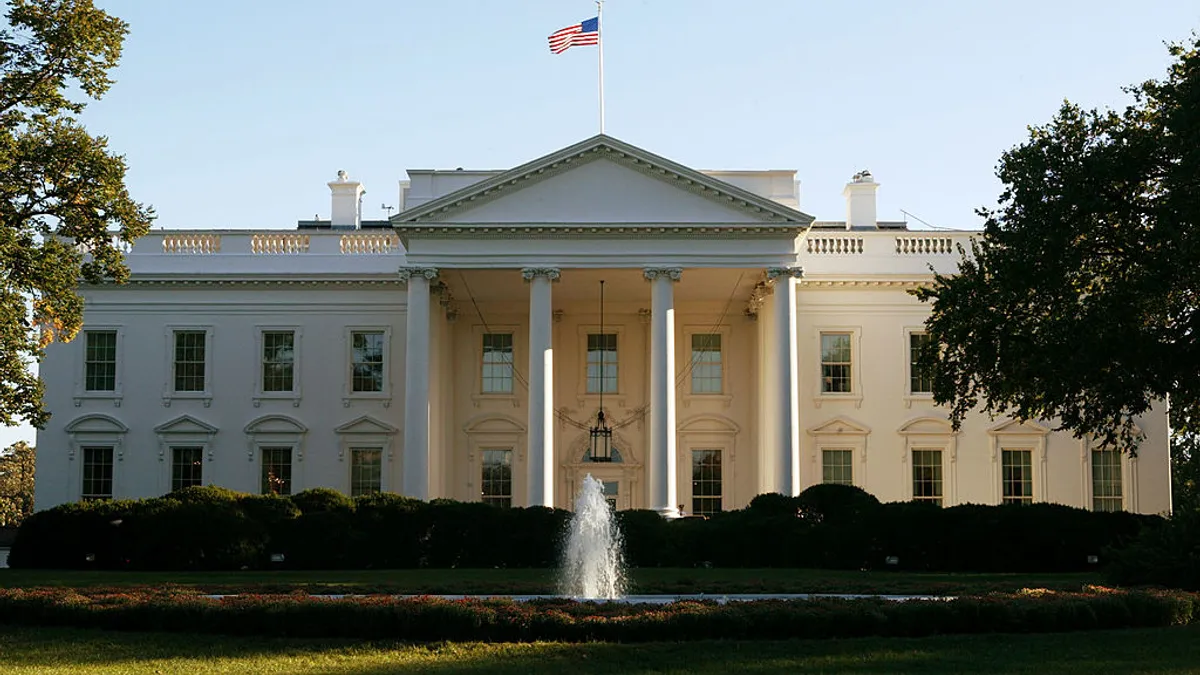Dive Brief:
- The Biden administration called on Congress Tuesday to pass legislation penalizing property owners for rent increases above a certain level as part of its plan to lower housing costs through a series of administrative actions.
- “Today, I’m sending a clear message to corporate landlords,” President Joe Biden’s statement reads. “If you raise rents more than 5% on existing units, you should lose valuable tax breaks.”
- Under Biden’s proposal, landlords would, for the rest of this year and for the next two years, only be able to take advantage of faster depreciation write-offs if they keep annual rent increases to no more than 5% each year. The plan would only apply to property owners with 50 units or more, and would exempt new construction projects or substantial renovations.
Dive Insight:
The Federal Housing Finance Agency is also making changes to its policies regarding housing financed by future loans provided through Freddie Mac and Fannie Mae. Borrowers will need to provide a 30-day notice before rent increases or lease expiration and a five-day grace period before imposing late fees on rent payments.
Alongside the rent restriction plan and FHFA changes, the president also announced efforts to repurpose public land and create new monetary grants for affordable housing development. This includes the potential construction of up to 15,000 new affordable housing units on public land in Nevada, rehabilitation of distressed housing and $325 million in grants from HUD for affordable housing construction.
The administration also called for the passage of the Biden-Harris Housing Plan, a proposal which would enable the construction of 2 million new homes and provide $10,000 in mortgage relief for borrowers.
Opposition to the plan
A variety of housing organizations, including both tenant and property owner advocacy groups, responded in different ways to the Biden administration’s plan.
The National Multifamily Housing Council, in a statement published one day before the White House’s announcement, opposed the plan in strong terms. The NMHC’s view is that instituting national rent control will drive up housing costs and limit new construction at a time when supply already falls short of demand.
“If the administration’s goal is to lower housing costs and support residents it would be better advised to implement policies that expand housing supply — the only real way to sustainably lower housing costs and create more housing security for renters as the Biden administration pointed out in its very own Housing Supply Action Plan,” said Sharon Wilson Géno, president of the NMHC, in the statement. “Rent control has been tried for decades and been a resounding failure. Now is the time for actual solutions, not electioneering.”
The Mortgage Bankers Association also came out against the rent control proposal, and cast doubt on whether it would be able to move through Congress into law.
“Rent control is a counter-productive policy idea that ultimately harms renters by distorting market pricing, discouraging new construction and degrading the quality of rental housing,” said Bob Broeksmit, president and CEO of the MBA. “While the odds are stacked against this proposal ever passing Congress, a federal rent control law would be catastrophic to renters and our nation’s rental housing market.”
Broeksmit also stated that the MBA is working with Biden, Congress and local municipalities to develop “commonsense solutions that will boost housing supply, lower costs for renters and improve the federal government’s multifamily lending programs.” These include enhancements to the Low-Income Housing Tax Credit program in order to incentivize low-income and workforce housing construction.
Voicing support
The Tenant Union Federation, a group that represents tenant unions throughout the country, voiced its support for the plan and called for the president to immediately regulate rents in federally financed housing.
“Rent control is sound economic policy, and it is the only solution that meets the urgency and scale of the crisis that millions of tenants endure every month,” Tara Raghuveer, director of the Tenant Union Federation, said in a statement provided to Multifamily Dive. “The president’s monumental directive is a recognition of the federal government’s responsibility to regulate the rental market, and of tenants’ power as a political class.”
The National Housing Law Project, a San Francisco-based housing law organization, also published a statement supporting the plan. “Tenants across the country fought for years to get the federal government to care about the rent,” Shamus Roller, executive director of NHLP, said in the statement. “We applaud the organizing that led President Biden to get real about what the federal government can do to increase housing stability for tenants.”











